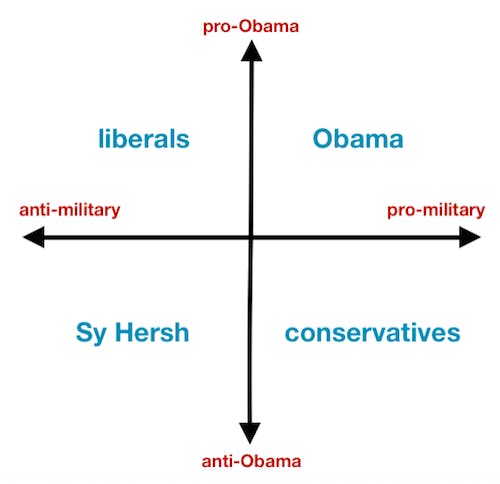Ten years ago, Sy Hersh was a widely celebrated journalist, considered one of the best at digging up the dark secrets behind the official stories of our various wars. Now, with his alternate history of the killing of Osama bin Laden, Hersh has “gone off the rails” and is “lost in a wilderness of mirrors.” What happened? It could be that the longtime New Yorker reporter has lost it. But possibly, maybe, a teeny tiny factor might be that there’s a Democrat in the White House—a combination of liberal reluctance to criticize President Barack Obama with conservative reluctance to criticize the military.
The response to Hersh’s 10,000-word London Review of Books report is dominated by skepticism, if not outright mockery. CNN’s Peter Bergen debunks Hersh’s “Allegations of massive cover-up.” Vox’s Max Fisher scoffs at “a story that accuses hundreds of people across three governments of staging a massive international hoax that has gone on for years.” Daily Telegraph Pakistan correspondent Rob Crilly calls it a “conspiracy theory” that will fool “the soft minded.”
You might expect conservatives to run with the dark comedy of the Obama White House scrambling to make up lies to take advantage of the death of America's No. 1 foe in an election year—only to watch those lies spiral out of control and create more foreign policy problems. But Rush Limbaugh led his show on Monday by talking about the usual stuff, Michelle Obama playing the "race card" or whatever. The conservative blog Hot Air said, “The first issue in any story written by Seymour Hersh is … Seymour Hersh. He has a habit of running with single-source stories that don’t pan out in the long run, and this tale has a number of red flags.” PJ Media’s Michael Walsh shrugs, “In the wilderness of mirrors that is the intelligence community and the Obama White House, believe almost nothing. Easier on your sanity that way.” Free Republic posters mostly made fun of the idea of a Muslim burial at sea; one lamented, "he meanders but the story gets down to the usual liberal bleeding-heart 'waterboarding-doesn’t-work' nonsense at the end." Even conspiracy theorist Alex Jones’ Infowars could only offer recycled outrage from years earlier.
This reaction would make sense if Hersh’s story actually described an epic hoax—like that bin Laden actually died years earlier, say, or that he’s a secret prisoner in Guantanamo, or that he’s partying right now in a CIA-funded discotheque in Tehran. But Hersh’s narrative doesn’t change all that much from the current Obama administration official story. The main takeaway is that Pakistan knew bin Laden was living in Abbottabad and that he was essentially a prisoner of Pakistan’s Inter-Services Intelligence agency. Hersh reports there was a plan for a bigger lie—the government would claim bin Laden was killed by a drone in the Hindu Kush mountains—which was never told because the helicopter crash at the Abbottabad compound would have raised too many questions. What Hersh claims were outright lies are the most Hollywood-esque flourishes of the official story: that the U.S. found bin Laden by tracking his courier, and that bin Laden’s body was buried at sea. These would be big lies (and a serious scandal) for any president of the United States. But in Hersh’s telling, there is a cover-up but not much of a crime. Ultimately, that’s Hersh’s point: “High-level lying nevertheless remains the modus operandi of US policy."
Let’s visualize Hersh's problem with a nifty chart, kind of like New York’s Approval Matrix, except with two axes that measure willingness to criticize the U.S. military and Obama: Hersh is out there, all alone, without friends among liberals or conservatives.

But things were not always this way. In 2005, Hersh reported that, even as Iraq was still in chaos, the Bush administration’s next target for democracy in the Middle East was Iran. In 2006, he reported there were plans for air strikes in Iran. These reports, which like the bin Laden story, made bold claims with anonymous sources, were considered evidence of the Bush administration’s insanity, not Hersh’s. (I remember going to a liberal blogger party in Washington, D.C. in late 2006, and seeing two up-and-comers make a bet over when Bush would bomb Iran.) Imagine if the raid that (supposedly) killed bin Laden had happened while George W. Bush were in office, and a conspiracy theory like Hersh’s story came out. Can't you hear Keith Olberman’s glee in recounting the dilettante president infuriating the Pentagon, screwing over the CIA, burning sources and a military ally with a carelessly written primetime speech announcing the death of the worst terrorist in the world?

If that sounds like a stretch, compare two headlines from ThinkProgress, the liberal news site run by the Center for American Progress. In 2008, ThinkProgress reported on Hersh's speech at a journalism conference under the headline, "EXCLUSIVE: To Provoke War, Cheney Considered Proposal to Dress Up Navy SEALS as Iranians and Shoot at Them." The article took seriously Hersh's claim that the Bush White House had been brainstorming pretexts for war with Iran and discussed a false flag operation. On Monday, ThinkProgress ran a post on Hersh’s bin Laden story with the headline, "The Story Behind the Story of Bin Laden’s Killing." This article collected the many criticisms of Hersh's report, leading with Pakistani claims that it was actually Hersh who was part of a conspiracy—a dupe fed false information to undermine Pakistan's military.
Why is it so believable the White House would dress up Navy SEALS as Iranians to start another war in the Middle East, but so unbelievable that the White House would lie about Pakistan's knowledge of bin Laden's location to protect its regional interests? Because of who was in the White House at the time. Hersh concludes his report by saying Obama isn't all bad, given his pursuit of a nuclear agreement with Iran. But that hostility to ruthless American military force—no matter who's in charge of it—is why, right now, Hersh doesn't have many friends.
